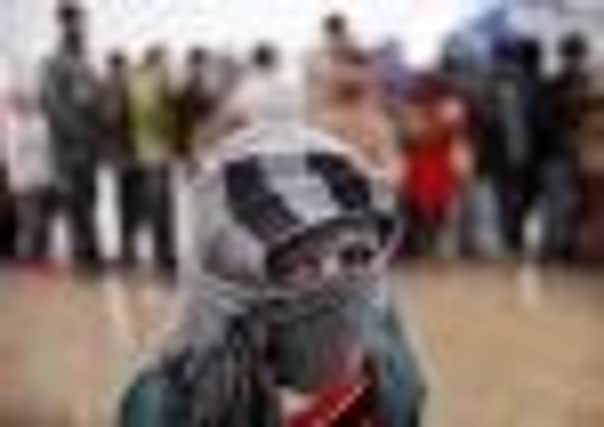Fleeing from bullets and air strikes, Syrian refugees face a brutal winter


“The cold is killing us,” many say. Having survived a conflict in which more than 40,000 people are estimated to have been killed, refugees at the Bab al-Salameh camp on the Syrian-Turkish border say the winter is now a bigger threat to them than the violence engulfing their country.
“The situation here is even worse than being at home,” said Waad Orfali, 27, as rain pounded the camp. “At least in the village there was a doctor,” said Mrs Orfali, who escaped from the northern village of Marea about two weeks ago, after snipers and air strikes forced her and her family to relocate to the relative safety of the camp.
Advertisement
Hide AdAdvertisement
Hide AdThe flimsy tents scattered across the encampment offer scant relief to the thousands of men, women and children facing freezing weather and constant rain, and colder conditions are still to come.
This month, the United Nations’ refugee agency said more than half a million Syrian refugees were registered or waiting in other countries.
“I’m three months pregnant and I’ve been bleeding,” said Mrs Orfali, who suffers from mouth sores. She said her husband had kidney stones, but neither had been able to get medical care.
“At home there’s no water or electricity and it’s the same thing here,” another woman chimed.
Tents reeked of damp as the rain seeped through, soaking blankets, clothes and rugs, and with no electricity in the camp, children, many wearing a single layer of clothing and slippers with no socks, shivered in the chill. Mothers complained they received little food. By the afternoon, they said breakfast had not been distributed.
“Tell them Syria’s people are full of lice,” said Um Ali, a mother of 12, said. She carried her ID papers in plastic to protect them from the rain in the hope that she could use them to get supplies from the camp authorities for her children.
Some refugees are trying to scrape a living amid the misery. They set up stands to sell cigarettes, and children zigzag through the tents hawking sweets and chocolate.
IHH, a Turkish relief group, is running the camp. Co-ordinator Shawkat Gukman said its 870 tents house about 6,000 people, with about 200 people streaming through each day.
Advertisement
Hide AdAdvertisement
Hide AdThe lack of water and electricity made food preparation and distribution particularly challenging, Mr Gukman added. “The crisis may last for years. It’s not clear but the war could last for a longer time.”
As the war continues, more Syrians are expected to flee. The latest estimates indicate that the total number of Syrians who have left their homes during the conflict has already surpassed the 700,000 the UNHCR forecast by year-end. Another 2.5 million or more are believed to be displaced inside Syria.
Um Ahmed, mother of five girls and two boys, said she moved to Bab al-Salameh four months ago from Aleppo. She said she was a supporter of Mr Assad at the beginning of the conflict, now in its 21st month.
“He said there wouldn’t be a drop of blood and now there’s a river of blood, so I’m opposed to him,” she said.
“We don’t want money, food or water. We just want the slaughter to stop. We dream of going home.”
No festive joy in Damascus
International envoy Lakhdar Brahimi pursued mediation efforts in Damascus yesterday, but there was no pause in the bloodletting, as Syrian Christians marked a bleak Christmas Day.
“We are here in a cave that symbolises Syria right now,” said a priest standing beside a nativity scene in a grotto.
“It is cold here, but the door is open to all refugees,” he told state TV. “Amid the hunger, cold and deprivation, we still have hope for peace and love for our country.”
Advertisement
Hide AdAdvertisement
Hide AdMr Brahimi met some dissidents tolerated by Bashar al-Assad, but rejected by rebels fighting to oust him, a day after he held talks with the Syrian president. There was no word on any progress in ending the intensifying violence.